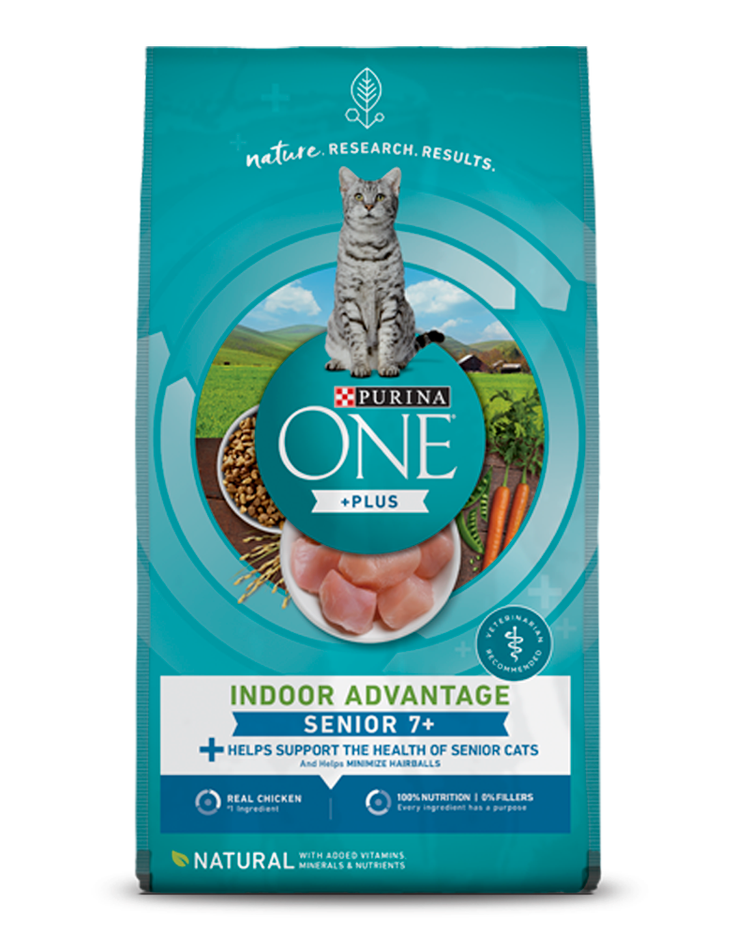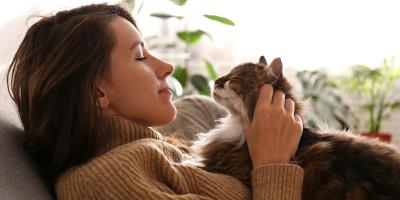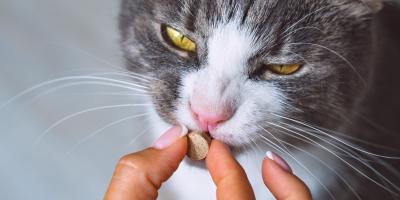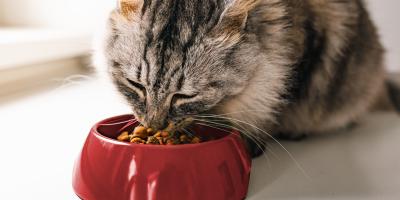Is Kitten Food Bad for Senior Cats?


Perhaps you’ve welcomed a new kitten into your family, and your resident senior cat is intrigued by the new bowl of kitten food next to their own senior cat food. Maybe you’re wondering whether you can free feed your new kitten and your senior cat together. Or possibly you’re considering kitten food for an underweight senior cat.
In any of these situations you’re probably also asking, Can older cats eat kitten food? More specifically, should they? Is kitten food good for senior cats?
Before we answer these questions, we first need to understand how kittens, adult cats and senior cats are different and how those differences affect their needs, especially in terms of nourishment.
Senior Cat Nutritional Needs Versus Kitten Nutritional Needs
Regardless of age, all cats are obligate carnivores. This means their bodies need nutrients that can only be obtained from animal products.
Watch your cat stalk a fly or pounce on a toy and you’ll see it – today’s cats evolved from hunters. And whether young or old, the instinct remains. So do their nutritional needs. Like the prey cats would consume in the wild, a cat's diet should provide protein in high amounts containing specific amino acids. It should also contain specific forms of fats/fatty acids and certain vitamins in higher amounts compared to omnivores. While not required, carbohydrates provide a protein-sparing effect.* Like the prey they would consume in the wild, a cat’s diet should provide protein in high amounts, fats and carbohydrates, plus other nutrients including vitamins, minerals, fatty acids, and amino acids.
While this holds true for cats of all life stages, the amounts of these nutrients required vary by life stage. And for good reason.
In addition to entertaining us with acts of outrageous cuteness, a kitten’s little body has the enormous job of developing into a fully grown cat during its first year.
Fueling that growth and keeping up with their energetic lifestyle, along with maintaining their body temperature and general function, requires specialized nutrition.
Unlike energetic, rapidly developing kittens, older cats tend to become less active and can lose body mass. So, their nutritional needs change accordingly.
The Difference Between Kitten and Senior Cat Food
Because cats have different nutritional needs at different stages of life, their diets need to change to support each life stage. The advantage of life stage nutrition is that these diets are formulated to provide complete and balanced nutrition for cats at specific stages throughout their lives.
Kitten Food
Since kittens are using a lot of energy to play, explore and grow, to thrive they need a diet formulated to provide more of the nutrients kittens need.
For example, while all cats need protein and other nutrients in their diets, the American Association of Feed Control Officials (AAFCO) recommends a minimum of 7.5 grams of protein per 100 calories (kcals) in kitten food. On the other hand, the recommendation for adult maintenance cat food is 6.5 grams of protein per 100 calories (kcals).
A quality kitten food, such as those developed by Purina, will also include nutrients such as DHA for brain and eye development in their ingredient list. If you’re shopping for a food to support healthy kitten growth, be sure to look for one that is complete and balanced for growth, not maintenance.
Senior Cat Food
While the goal of a quality kitten food is to fuel activity and support healthy growth, the role of a complete and balanced adult or senior food is to help cats maintain optimal overall body condition and health during their adult or senior years.
When it comes to nutrient requirements for cat food, AAFCO only recognizes growth and adult maintenance life stages. While a senior cat may do quite well on an adult maintenance diet, a food formulated for senior cats can provide advantages such as high protein to maintain lean muscle mass, increased antioxidant support for health, or even certain fibers to help with digestion and healthy GI support.
Can Senior Cats Eat Kitten Food?
In some instances, a veterinarian may recommend kitten food vs. senior cat food in cases where a senior cat is failing to thrive or needs incentive to stimulate appetite. Unless your veterinarian has advised this course of action for your senior cat, feeding a cat food formulated for senior cats is the best way to feel confident that your cat is getting targeted nutrition they can benefit from.
How to Keep a Cat from Eating Kitten Food
Remember our initial feeding situation involving the senior cat wanting to nibble on the kitten’s dinner? If this is a feeding challenge in your household, here are some strategies to feed multiple cats different meals while maintaining bowl boundaries:
- Give each cat their own space. This may be as simple as establishing different spaces within the same room and supervising. Or you may need to designate different rooms for different cats or use cat crates to give both your kitten and senior cat the security of eating without interruption.
- Do not free feed. If different diets are being served, access needs to be structured and limited.
- Establish a regular feeding schedule. Regular mealtimes allow you to make sure both your kitten food and senior cat food benefit the right pets. Like the rest of your family, it also gives your family felines something to look forward to.
- Try a smart feeding bowl. These bowls and associated collars, which trigger the release of a portion of kibble when a cat approaches, can be especially useful if space or feeding style preferences differ between cats (for example, if one prefers to graze while the other prefers to eat all the food offered at once).
Feed Your Senior Cat the Right Food for Their Life Stage
Feeding nutrition formulated for the right life stage is the best way to keep your senior cat healthy as they develop and age. While kitten food might be a temptation for your senior cat, keeping them focused on a quality food formulated for senior cats is the best way to help them continue to enjoy good health throughout their life.
For more expert tips on feeding your cat, explore our other cat feeding articles.
* Laflammme D. Focus on Nutrition: Cats and carbohydrates: implications for health and disease. Compend Contin Educ Vet. 2010 Jan;32(1):E1-3. PMID: 20473847.

Be Rewarded for Your Purina Purchases
Earn and redeem points for Purina products with myPurina app.




